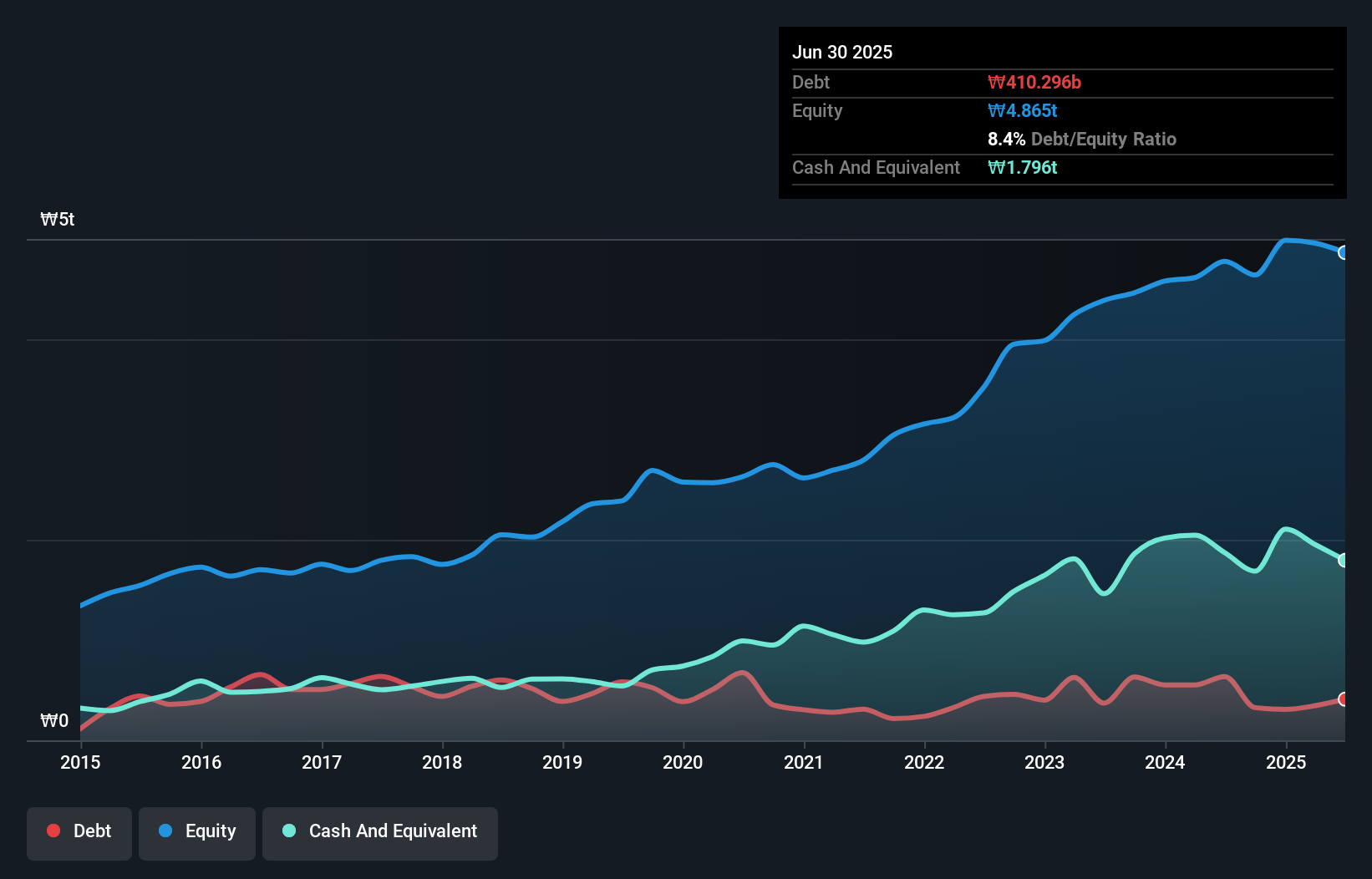The external fund manager backed by Berkshire Hathaway's Charlie Munger, Li Lu, makes no bones about it when he says 'The biggest investment risk is not the volatility of prices, but whether you will suffer a permanent loss of capital.' When we think about how risky a company is, we always like to look at its use of debt, since debt overload can lead to ruin. Importantly, Youngone Holdings Co., Ltd. (KRX:009970) does carry debt. But is this debt a concern to shareholders?
When Is Debt A Problem?
Debt assists a business until the business has trouble paying it off, either with new capital or with free cash flow. In the worst case scenario, a company can go bankrupt if it cannot pay its creditors. However, a more frequent (but still costly) occurrence is where a company must issue shares at bargain-basement prices, permanently diluting shareholders, just to shore up its balance sheet. Having said that, the most common situation is where a company manages its debt reasonably well - and to its own advantage. The first thing to do when considering how much debt a business uses is to look at its cash and debt together.
What Is Youngone Holdings's Net Debt?
The image below, which you can click on for greater detail, shows that Youngone Holdings had debt of ₩410.3b at the end of June 2025, a reduction from ₩634.9b over a year. But on the other hand it also has ₩1.80t in cash, leading to a ₩1.39t net cash position.

How Healthy Is Youngone Holdings' Balance Sheet?
According to the last reported balance sheet, Youngone Holdings had liabilities of ₩923.9b due within 12 months, and liabilities of ₩751.8b due beyond 12 months. On the other hand, it had cash of ₩1.80t and ₩806.8b worth of receivables due within a year. So it actually has ₩926.8b more liquid assets than total liabilities.
This surplus liquidity suggests that Youngone Holdings' balance sheet could take a hit just as well as Homer Simpson's head can take a punch. With this in mind one could posit that its balance sheet means the company is able to handle some adversity. Succinctly put, Youngone Holdings boasts net cash, so it's fair to say it does not have a heavy debt load!
See our latest analysis for Youngone Holdings
The modesty of its debt load may become crucial for Youngone Holdings if management cannot prevent a repeat of the 32% cut to EBIT over the last year. When a company sees its earnings tank, it can sometimes find its relationships with its lenders turn sour. There's no doubt that we learn most about debt from the balance sheet. But you can't view debt in total isolation; since Youngone Holdings will need earnings to service that debt. So if you're keen to discover more about its earnings, it might be worth checking out this graph of its long term earnings trend.
But our final consideration is also important, because a company cannot pay debt with paper profits; it needs cold hard cash. While Youngone Holdings has net cash on its balance sheet, it's still worth taking a look at its ability to convert earnings before interest and tax (EBIT) to free cash flow, to help us understand how quickly it is building (or eroding) that cash balance. During the last three years, Youngone Holdings produced sturdy free cash flow equating to 55% of its EBIT, about what we'd expect. This cold hard cash means it can reduce its debt when it wants to.
Summing Up
While we empathize with investors who find debt concerning, you should keep in mind that Youngone Holdings has net cash of ₩1.39t, as well as more liquid assets than liabilities. So we don't think Youngone Holdings's use of debt is risky. The balance sheet is clearly the area to focus on when you are analysing debt. However, not all investment risk resides within the balance sheet - far from it. For example, we've discovered 1 warning sign for Youngone Holdings that you should be aware of before investing here.
If you're interested in investing in businesses that can grow profits without the burden of debt, then check out this free list of growing businesses that have net cash on the balance sheet.
New: Manage All Your Stock Portfolios in One Place
We've created the ultimate portfolio companion for stock investors, and it's free.
• Connect an unlimited number of Portfolios and see your total in one currency
• Be alerted to new Warning Signs or Risks via email or mobile
• Track the Fair Value of your stocks
Have feedback on this article? Concerned about the content? Get in touch with us directly. Alternatively, email editorial-team (at) simplywallst.com.
This article by Simply Wall St is general in nature. We provide commentary based on historical data and analyst forecasts only using an unbiased methodology and our articles are not intended to be financial advice. It does not constitute a recommendation to buy or sell any stock, and does not take account of your objectives, or your financial situation. We aim to bring you long-term focused analysis driven by fundamental data. Note that our analysis may not factor in the latest price-sensitive company announcements or qualitative material. Simply Wall St has no position in any stocks mentioned.
About KOSE:A009970
Youngone Holdings
Manufactures and sells apparel, footwear, gear, sportswear, and jackets in South Korea and internationally.
Flawless balance sheet, good value and pays a dividend.
Similar Companies
Market Insights
Community Narratives



